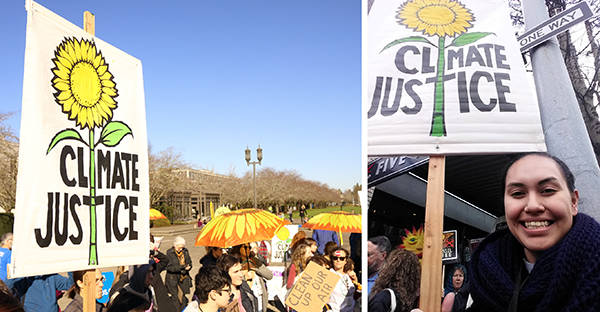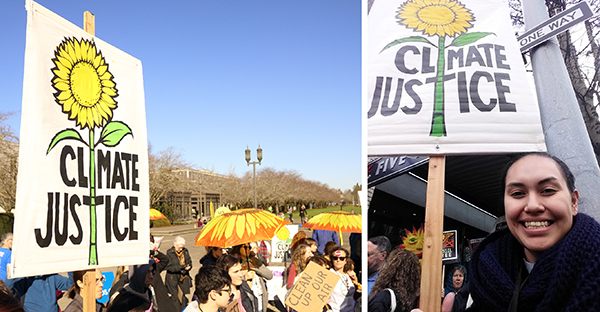As we expand our understanding and response to the COVID-19 pandemic, we need to start thinking about how we are going to move forward after the global pandemic. There is a glimmer of hope that we will take a step towards changing the current socioeconomic structure built upon never-ending expansion that extracts finite resources and uses the public’s common air and water as the dumping ground for pollution and waste. I hope there is a silver lining in this crisis that set us upon a path towards a society that promotes sustainability and supports resilient communities.
Although it may be difficult to tell what the future will look like, we know that the impacts caused by the pandemic will be devastating to our economy and social structures. While the pandemic is a priority issue that needs to be addressed now, let’s think about the ways in which our past actions have influenced our current circumstances. Our attention should be directed at the ways in which society’s “business as usual” way of life has created long-lasting environmental damage to the Earth’s ecosystems, and has left us unprepared to respond to the emergency at hand. We need to address this devastating damage now before we carelessly set ourselves back on the old path to the point of no return.

We Cannot Forget About the Fight Against Climate Change!
Recent environmental regulation rollbacks and continued support of the fossil fuel industry have made clear that the current Administration cares little about preparing for climate change impacts. While we brace ourselves for the outcomes of this and possible repetitions of the COVID-19 pandemic, consider how the negative effects of a virus could be exacerbated by climate change.
Our response will be influenced by disruptions such as forced relocation due to extreme weather events and resulting changes in demographics as people seek relief from intense heat, failed crops or raging hurricanes. Cultural losses will also be profound among those who rely on healthy and abundant natural resources to sustain their livelihoods. Destroying natural resources through practices such as deforestation will cause greenhouse gas emissions to keep rising, and negatively impact our health and well being.
Disproportionate Impacts on Frontline Communities - Uncomfortable Similarities
It is increasingly clear that frontline communities are suffering the greatest impacts from both the COVID-19 pandemic and climate change. The similarities are stark. Frontline communities - communities of color, Tribes and indigenous peoples, and low-income populations - most often bear the brunt of disasters caused by extreme weather events and other climate-related impacts. Drought can cause threats to food security and nutrition. Wildfires and flooding destroy homes. Rising sea levels can wipe out entire coastal communities. Vulnerable communities suffer disproportionate harm through depression or post traumatic stresses that understandably accompany disasters and loss.
Moving Forward
Our decision-makers must develop adaptation and mitigation policies that acknowledge the disproportionate impacts on frontline communities, and implement actions that equally benefit their health and well-being. Our system of top down governance has failed us. Instead, solutions need to be developed by communities themselves.
We must not give in to despair. We must endeavor to find the right path in all of this chaos. Join me in imagining a world where our children and future generations will be able to thrive. Imagine them with full equality and equity, enjoying the world’s natural gifts. Imagine how amazing it will be for them to know that the earth’s previous stewards stood strong and persisted in their fight for climate justice.
Haley Case-Scott,
Beyond Toxics Climate Justice Grassroots Organizer
Consulted Sources
Anderson, INGER. “First Person: COVID-19 Is Not a Silver Lining for the Climate, Says UN Environment Chief.” UN News, 5 Apr. 2020, https://news.un.org/en/story/2020/04/1061082.
“Donald Trump.” Inside Climate News, 2020. https://insideclimatenews.org/tags/donald-trump.
Ebi, K.L., J.M. Balbus, G. Luber, A. Bole, A. Crimmins, G. Glass, S. Saha, M.M. Shimamoto, J. Trtanj, and J.L. White-Newsome, 2018: Human Health. In Impacts, Risks, and Adaptation in the United States: Fourth National Climate Assessment, Volume II [Reidmiller, D.R., C.W. Avery, D.R. Easterling, K.E. Kunkel, K.L.M. Lewis, T.K. Maycock, and B.C. Stewart (eds.)]. U.S. Global Change Research Program, Washington, DC, USA, pp. 539–571. doi: 10.7930/NCA4.2018.CH14
“EPA Announces Enforcement Discretion Policy for COVID-19 Pandemic.” EPA News Releases, 26 Mar. 2020, https://www.epa.gov/newsreleases/epa-announces-enforcement-discretion-policy-covid-19-pandemic.
“Everyone Included: Social Impact of COVID-19 | DISD.” United Nations; Department of Economic and Social Affairs, United Nations, www.un.org/development/desa/dspd/everyone-included-covid-19.tml.
LaPier, Rosalyn, and Abaki Beck. “Misrepresenting Traditional Knowledge during COVID-19 Is Dangerous.” High Country News, 23 Mar. 2020, https://www.hcn.org/articles/covid19-misrepresenting-traditional-knowledge-during-covid-19-is-dangerous?fbclid=IwAR2v3TnFVBvhCzeU4qNbZHScpFDFBPldqL-inqyEpcpvvm2rbwxjsVUhJ0E.
Smith, K.R., A.Woodward, D. Campbell-Lendrum, D.D. Chadee, Y. Honda, Q. Liu, J.M. Olwoch, B. Revich, and R. Sauerborn, 2014: Human health: impacts, adaptation, and co-benefits. In: Climate Change 2014: Impacts, Adaptation, and Vulnerability. Part A: Global and Sectoral Aspects. Contribution of Working Group II to the Fifth Assessment Report of the Intergovernmental Panel on Climate Change [Field, C.B., V.R. Barros, D.J. Dokken, K.J. Mach, M.D. Mastrandrea, T.E. Bilir, M. Chatterjee, K.L. Ebi, Y.O. Estrada, R.C. Genova, B. Girma, E.S. Kissel,A.N. Levy, S. MacCracken, P.R. Mastrandrea, and L.L.White (eds.)]. Cambridge University Press, Cambridge, United Kingdom and New York, NY, USA, pp. 709-754






